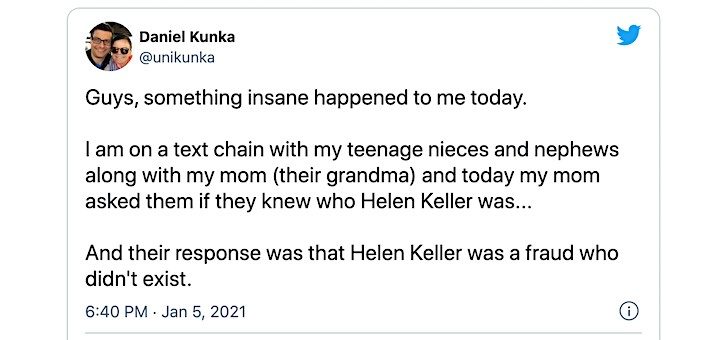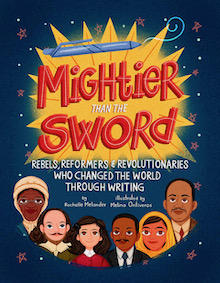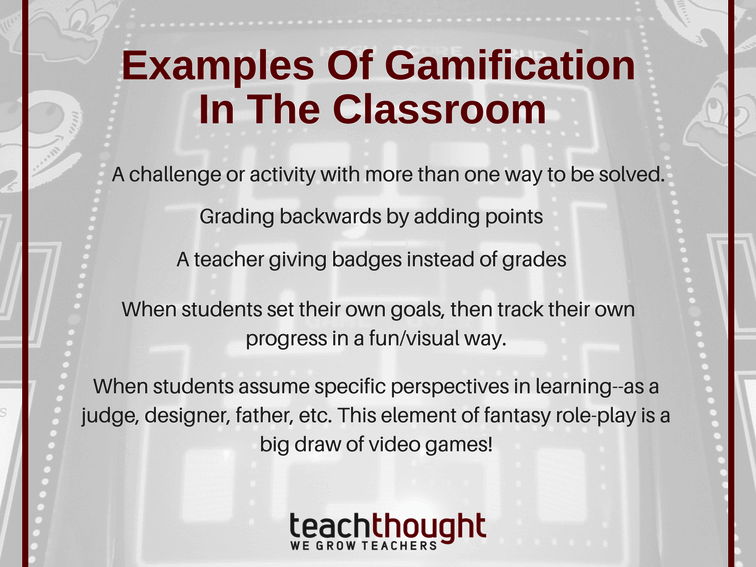Was Helen Keller Real? Engaging Kids in History
By Rochelle Melander

I opened TikTok and watched videos of young people declaring that a deafblind woman like Helen Keller couldn’t have written books and delivered speeches.
(Here’s a video exploring the trend: https://www.youtube.com/watch?v=srw4sItmuIw).
We could sigh and say, “Kids today!” (I did.) We could rant about the challenge of ableism. (I did that, too.) Or we can work to engage young people in studying and writing about history. Here’s one way I’ve found to be effective.
Design a Quest
For a generation of young people who love video games, framing a research project as a quest can be a helpful way to engage them. It makes a game out of pouring through documents in search of the truth.
Companies like Google, Cisco, and Domino’s Pizza have used gamification—applying gaming principles to nongaming tasks—to train employees and boost performance.
Schools have also adopted gamification as a learning tool. At TeachThought Ryan Schaaf and Jack Quinn provide 12 Examples Of Gamification In The Classroom:
Define the Quest
Every video game has a “game description” to attract potential players. It helps players understand what the quest is about, what’s at stake, and how they’re going to approach the problem. Students choose their quest, identify key steps and elements, and describe it. The following elements will go into the game description and help guide students to their big win:
► A real question. What are your students curious about? Students will be more excited about taking on a quest based on their questions. If you’ve got a unit theme, such as “scientific discoveries” or “Civil war,” work with students to brainstorm topics that pique their interest. They might search online for real life mysteries, conspiracy theories, or topics related to personal interests (like a hobby, sport, or life situation, like ADHD).
Download my example worksheet for Helen Keller
► A specific goal. Narrowing the research question to a specific measurable goal will help students succeed. A student interested in discovering the truth about Helen Keller might start with, “Research Helen Keller.” But that goal is too big to manage or measure. Instead, the student might narrow their question to, “Discover how Helen Keller prepared and gave speeches” or “Research another deafblind person who became successful and share how they did it.” (K12Academics offers a list of famous deafblind people.)

► Allies. Every superhero has a sidekick and a team of allies to call on when things get tough. Group students together by study themes or skill sets so that they can cheer each other on and help each other through the tough parts.
► Power-ups. If you’ve ever played a video game, you know that power-ups give you extra abilities to navigate the tough levels. As a class, make a list of power-ups that students can use when they get stuck. This list might include talking to the school librarian, searching online, checking out Wikipedia, brainstorming new research questions with their allies, or anything else that will help them achieve their goal.
► A research map. For a research quest, students can create a list of potential steps for discovering information. Here are some ideas:
• Get an overview of the topic and context. Before delving into their specific research question, students can use children’s books and Wikipedia to understand the big picture. And both of these resources have a secret treasure: footnotes. Footnotes will point students to more sophisticated sources and original texts.
• Read pertinent sections of longer biographies. Footnotes and indexes can help students find key sections in longer books—and discover answers to their specific questions.
• Read primary sources. Ask students to use one original text in their quest. Primary sources can provide helpful details that are not present in secondary sources. Many primary sources are available for free online. These might include the subject’s own books, speeches, and letters; newspaper articles about them; or public documents, like marriage records.
Game play tip: Before the students dig into a primary source, it can be helpful to discuss the questions that historians ask: Who was the author’s intended audience? Can we trust the writer? Is there other evidence to support their statement?
• Presentation. Allow each student to decide how they might present their research. Some students love writing reports, while others will spend the whole quest dreading (and procrastinating) putting together their “post-game analysis.” Encourage students who dislike writing to explore unique ways to present their information, maybe in a way that relates to their interests. Students might present their findings as crime incident reports, newspaper articles, Twitter threads, patient care reports, graphic panels, or courtroom arguments.
Game play tip: Check out the research quest worksheet below this post, which provides a template for putting all of this information in one place.
Celebrate the Results
Video games have a reward cycle. When a player accomplishes a task or achieves a goal, they receive a reward. These are usually virtual rewards, like new costumes, weapons, or coins players can spend in the game.
At the end of a research quest, a good grade might be part of the reward. But it can’t be the whole thing. Just as valuable as the “A” on their report card might be the social cred students get from the class or the supportive words they hear from you and their parents. Here are some possible ways to celebrate results:
► Presentation to class. Students share their findings with their groups of allies or the whole class.
► Gallery walk. Think science fair meets gallery night. Students can set up their work and invite classmates and parents to see their findings and ask questions.
► Media. Invite class members to consider how they might use new media to share their results. Infographics, videos, Instagram stories, and Prezi presentations are all possibilities. Maybe your class can create a Tik-Tok video that proves Helen Keller was real?
The Epic Win
For a gamer, the epic win happens when they accomplish something bigger and better than they ever thought possible. In the course of tackling this quest, your students will most definitely have wins. But their epic win will be learning how to ask questions, research the facts, and present the findings in interesting ways. In short, this quest will strengthen your students analytical thinking skills. And then they can take on the conspiracy theorists of the future.

Rochelle spent the last year researching and writing her debut book for children. Mightier Than the Sword: Rebels, Reformers, and Revolutionaries Who Changed the World through Writing is a middle grade social justice book pairing life changing writing exercises with the stories of a diverse group of people who changed lives and communities throughout history. The book features people from a variety of disciplines who used their words to educate people about the stars, give rights to women, end slavery, save the environment, protest injustice, and more.
































